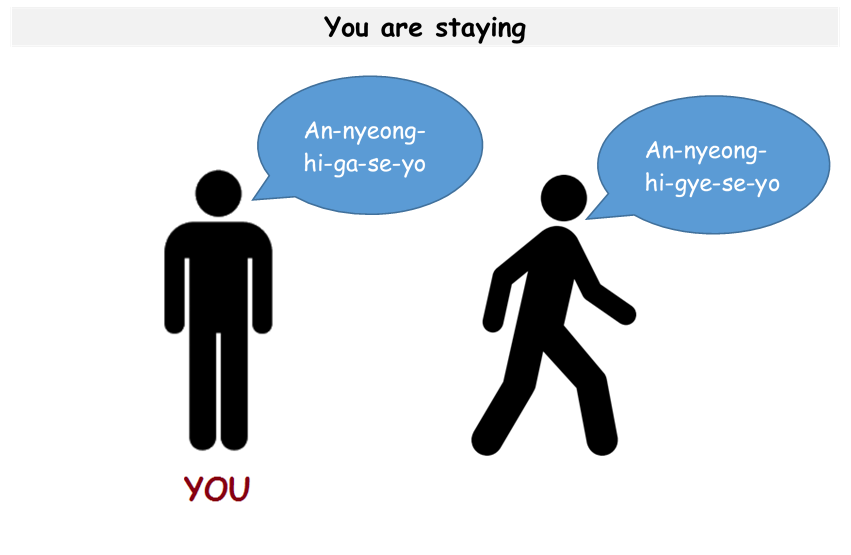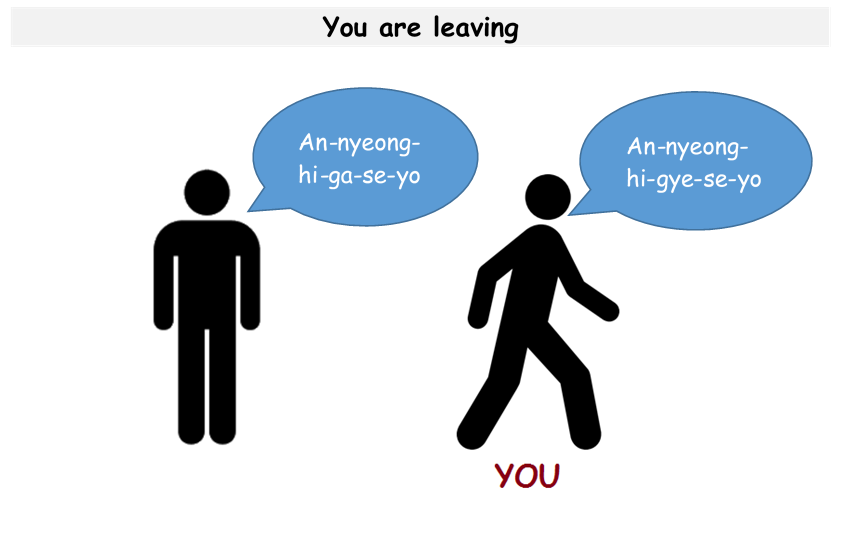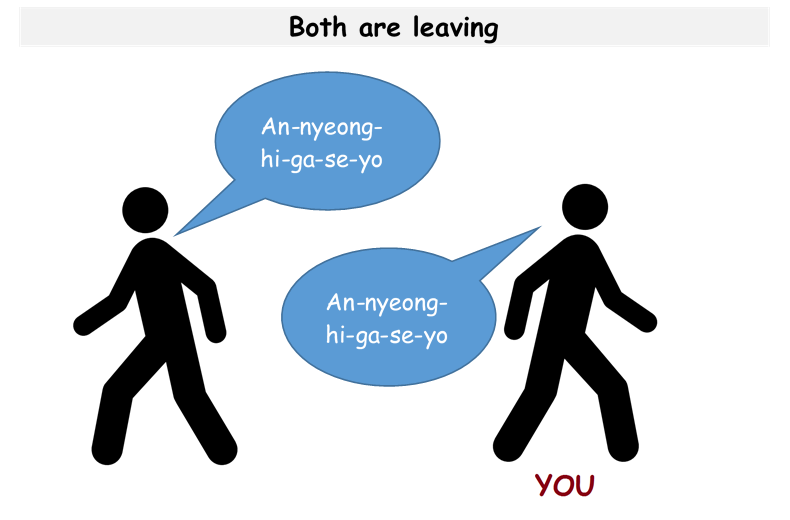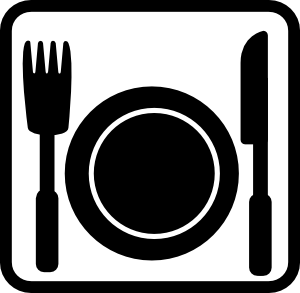I have compiled some of the common phrases that you might hear or need to use when you encounter with the locals. It's a short lesson that will suffice for getting around in Korea.
One of the important thing to note about the language is that it comes in formal and informal manner. Formal manner (jondaemal 존대말) is often used when speaking to people who are older than you or to strangers. It's a commonly used form to show respect during the conversation. The informal manner (banmal 반말) is only used with those who are close to you. It signifies closeness if used with people of same age or younger than you but it's disrespectful to use it when speaking with those who are older than you. Therefore, it will be more appropriate to learn the Formal Manner of Korean language for a start.
Are you ready? Here we go! ヽ( ★ω★)ノ
Common Greetings
Hello: An-nyeong-ha-se-yo (안녕하세요)
The phrase "An-nyeong-ha-se-yo" can be used literally during anytime of the day or night. It carries the meaning "peace be with you" and is used as a common greeting when you meet anyone.
Hello (on the phone): Yeo-bo-se-yo (여보세요)
Goodbye(said to the person leaving): An-nyeong-hi-ga-se-yo (안녕히 가세요)
Goodybye(said to the person staying): An-neyong-hi-gye-se-yo (안녕히 계세요)
The goodbyes may be a little confusing to you at first. Therefore, I have put together three scenarios to help you understand the correct term to use. Hope it helps!
The goodbyes may be a little confusing to you at first. Therefore, I have put together three scenarios to help you understand the correct term to use. Hope it helps!
Thank you:
Kam-sa-ham-ni-da (감사합니다)
Ko-map-seum-ni-da (고맙습니다)
Kam-sa-ham-ni-da (감사합니다)
Ko-map-seum-ni-da (고맙습니다)
Welcome (After someone says thank you): Cheon-ma-ne-yo (천만에요)
Welcome (Welcome to my place):
O-seo-o-se-yo (어서 오세요)
Hwan-yeong-ham-ni-da (환영합니다)
I'm sorry: Mi-an-ham-ni-da (미안합니다)
Excuse Me: Sil-lye-ham-ni-da (실례합니다)
Getting someone's attention: Jeo-gi-yo! (저기요)
Yes: Ne (네)
No: A-ni-yo (아니요)
Welcome (Welcome to my place):
O-seo-o-se-yo (어서 오세요)
Hwan-yeong-ham-ni-da (환영합니다)
Important Phrases
I'm sorry: Mi-an-ham-ni-da (미안합니다)
Excuse Me: Sil-lye-ham-ni-da (실례합니다)
Getting someone's attention: Jeo-gi-yo! (저기요)
Yes: Ne (네)
No: A-ni-yo (아니요)
Where is ... ? : .... eo-di-seo-yo? (어디서요)
Add the Place of Interest before "eo-di-seo-yo".
Eg: Where is the subway station? -> Jeon-cheol-yeok eo-di-seo-yo?
I think this is one of the most important phrases to learn. ツ
Where is the toilet?: Hwa-jang-shil-eo-di-seo-yo? (화장실 어디 있어요)
Add the Place of Interest before "eo-di-seo-yo".
Eg: Where is the subway station? -> Jeon-cheol-yeok eo-di-seo-yo?
I think this is one of the most important phrases to learn. ツ
Where is the toilet?: Hwa-jang-shil-eo-di-seo-yo? (화장실 어디 있어요)
Left: Oen-jjok (왼쪽)
Right: O-reun-jjok (오른쪽)
Straight: Jik-jin (직진)
Market: Shi-jang (시장)
Market: Shi-jang (시장)
Subway: Ji-ha-cheol (지하철)
Bus: Beo-seu (버스)
Subway Station: Jeon-cheol-yeok (전철역)
Train Station: Gi-cha-yeok (기차역)
Bus: Beo-seu (버스)
Subway Station: Jeon-cheol-yeok (전철역)
Train Station: Gi-cha-yeok (기차역)
Bargaining in Korea
How much is this? : I-geo-eol-ma ye-yo (이거 얼마예요)
It is expensive: Bi-ssa-yo (비싸요)
Please give me a discount: Jom ggak-a-ju-se-yo (좀 깎아주세요)
Dining in Korea
It's delicious: Ma-si-sseo-yo (맛이 있어요)
Can I see the menu, please?: Me-nyu bo-yeo-ju-se-yo (메뉴 보여 주세요)
What do you recommend?: Mweo-ga ma-si-sseo-yo? (뭐가 맛있어요)
Can I have more of this,please?: I-geot-deo-ju-se-yo (이것 좀 더 주세요)
Can I have an extra dish please? : Ap-jeob-shi-ju-se-yo ( 앞 접시 주세요)
Addressing people in Korea
Mr./Mrs./Miss : <Name> -ssi (씨)
Add the name of the person before "-ssi". Eg: Yoo Jae Suk-ssi.
Father: A-beo-ji (아버지)
Mother: Eo-meo-ni (어머니)
You can address the people who older than you as "A-beo-ji" and "Eo-meo-ni" . It seems warmer to call them that way, as though they are your own parents. Well, I think that most of the ladies would prefer to be called "Eo-meo-ni' instead of "Ah-jum-ma". (Ah-jum-ma is often used for married ladies. It can be an insult in a way if you called a younger person an "ah-jum-ma" )
Addressing people in Korea differs according to gender, so make sure you address them correctly!
If you are a girl, this is how you should call your brother/sister.
Older Brother : Op-pa (오빠)
Older Sister : Eon-ni (언니)
The term, "Op-pa" is also generally used when a girl addresses her boyfriend.
If you are a guy, this is how you should call your brother/sister.
Older Brother : Hyung (형)
Older Sister : Nu-na (누나)
For younger brothers/sisters, you can use a general term dong-saeng (동생).
If you are interested to learn more about the language and even the writing system, these are the websites I have found to be most useful.
Lessons (Talk to Me in Korean)
Learning Hangeul -Korean Alphabets (Talk to Me in Korean)
Korean Alphabets are not difficult to pick up as they have fewer consonants than our English alphabets. Personally, I think that it's much simpler to learn them compared to the Japanese and Chinese characters. Ah well, that's my personal opinion. Do have fun learning!!






.svg/580px-Japanese_Road_sign_(Follow_Directions_A).svg.png)




No comments:
Post a Comment